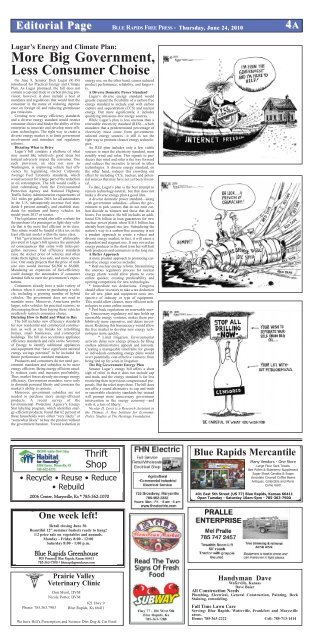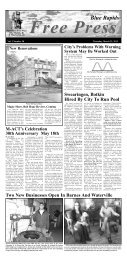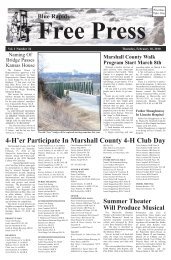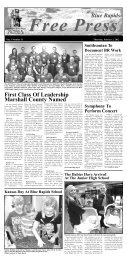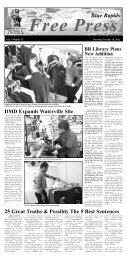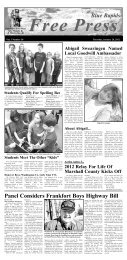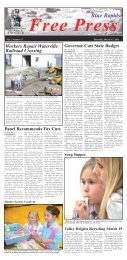eFreePress 06.24.10.pdf - Blue Rapids Free Press
eFreePress 06.24.10.pdf - Blue Rapids Free Press
eFreePress 06.24.10.pdf - Blue Rapids Free Press
You also want an ePaper? Increase the reach of your titles
YUMPU automatically turns print PDFs into web optimized ePapers that Google loves.
Editorial Page BLUE RAPIDS FREE PRESS - Thursday, June 24, 2010<br />
4A<br />
Lugar’s Energy and Climate Plan:<br />
More Big Government,<br />
Less Consumer Choise<br />
On June 9, Senator Dick Lugar (R–IN)<br />
introduced his Practical Energy and Climate<br />
Plan. As Lugar promised, the bill does not<br />
contain a cap-and-trade or carbon pricing provision;<br />
however, it does include a host of<br />
mandates and regulations that would hurt the<br />
consumer in the name of reducing dependence<br />
on foreign oil and reducing greenhouse<br />
gas emissions.<br />
Creating new energy efficiency standards<br />
and a diverse energy standard would restrict<br />
consumer choice and hinder the ability of free<br />
enterprise to innovate and develop more efficient<br />
technologies. The right way to create a<br />
diverse energy market is to limit government<br />
involvement and introduce real regulatory<br />
reforms.<br />
Dictating What to Drive<br />
Lugar’s bill contains a plethora of what<br />
may sound like intuitively good ideas but<br />
instead adversely impact the consumer. One<br />
such provision, an idea not new to<br />
Washington, is improving vehicle fuel efficiency<br />
by legislating stricter Corporate<br />
Average Fuel Economy standards, which<br />
would account for a large part of the reduction<br />
in oil consumption. The bill would codify a<br />
joint rulemaking from the Environmental<br />
Protection Agency and National Highway<br />
Traffic Safety Administration requirements of<br />
34.1 miles per gallon 2016 for all automakers<br />
in the U.S, subsequently increase fuel standards<br />
4 percent annually, and establish standards<br />
for medium and heavy vehicles for<br />
model years 2017 or sooner.<br />
The legislation would also offer a rebate for<br />
the purchase of a passenger or light-duty vehicle<br />
that is the most fuel efficient in its class.<br />
This rebate would be funded with a tax on the<br />
least efficient model within the same class.<br />
This “government knows best” philosophy<br />
prevalent in Lugar’s bill ignores the unintended<br />
consequences that come with miles-pergallon<br />
increases. Fuel efficiency standards<br />
raise the sticker price of vehicles and often<br />
make them lighter, less safe, and more expensive.<br />
One study projects that the price of midsize<br />
cars would increase $4,500 to $6,000.<br />
Mandating an expansion of fuel-efficiency<br />
could damage the automakers if consumer<br />
demand fails to meet the government’s expectations.<br />
Consumers already have a wide variety of<br />
choices when it comes to purchasing a vehicle,<br />
including a growing number of hybrid<br />
vehicles. The government does not need to<br />
mandate more. Moreover, Americans prefer<br />
larger, safer vehicles for practical reasons, so<br />
discouraging them from buying these vehicles<br />
needlessly restricts consumer choice.<br />
Dictating How to Build and What to Buy<br />
The bill includes new efficiency standards<br />
for new residential and commercial construction<br />
as well as tax breaks for retrofitting<br />
homes, small businesses, and commercial<br />
buildings. The bill also accelerates appliance<br />
efficiency standards and calls on the Secretary<br />
of Energy to identify additional appliances<br />
and equipment that “have significant national<br />
energy savings potential” to be included for<br />
future performance standard mandates.<br />
Producers and consumers do not need government<br />
mandates and subsidies to be more<br />
energy efficient. Being energy efficient usually<br />
reduces costs and increases profitability.<br />
Thus, market forces already encourage energy<br />
efficiency. Government mandates serve only<br />
to diminish personal liberty and constrain the<br />
market’s ability to operate.<br />
Moreover, government subsidies are not<br />
needed to purchase more energy-efficient<br />
products. A recent survey of the<br />
Environmental Protection Agency’s Energy<br />
Star labeling program, which identifies energy-efficient<br />
products, found that 62 percent of<br />
these households were either “very likely” or<br />
“somewhat likely” to buy the product without<br />
the government handout. Forced reduction in<br />
• Recycle • Reuse • Reduce<br />
• Rebuild<br />
2006 Center, Marysville, Ks * 785-562-1070<br />
Season One week Ending left!<br />
Retail closing June 30.<br />
Beautiful 12" summer forFall baskets ready Mums<br />
to hang!<br />
The Pumpkins Are Here<br />
<strong>Blue</strong> <strong>Rapids</strong> Greenhouse<br />
805 Pomeroy, <strong>Blue</strong> <strong>Rapids</strong>, Kansas 66411<br />
785-363-7300 • bluerapidsgreenhouse.com<br />
Prairie Valley<br />
Veterinary Clinic<br />
Don Musil, DVM<br />
Nicole Porter, DVM<br />
821 Hwy 9<br />
Phone: 785.363.7903 <strong>Blue</strong> <strong>Rapids</strong>, Ks 66411<br />
We have Hill’s Prescription and Science Diet Dog & Cat Food<br />
energy use, on the other hand, causes reduced<br />
product performance, reliability, and longevity.<br />
A Diverse Domestic Power Standard<br />
Lugar’s diverse energy standard would<br />
greatly expand the flexibility of a carbon-free<br />
energy standard to include coal with carbon<br />
capture and sequestration (CCS) and nuclear<br />
energy. But more significantly, it includes<br />
qualifying emissions-free energy sources.<br />
While Lugar’s plan is less onerous than a<br />
renewable electricity standard (RES)—which<br />
mandates that a predetermined percentage of<br />
electricity must come from governmentselected<br />
energy sources—it still is not the<br />
right way to promote cleaner energy technologies.<br />
An RES plan includes only a few viable<br />
sources to meet the electricity standard, most<br />
notably wind and solar. This signals to producers<br />
that wind and solar is the way forward<br />
and reduces the incentive to invest in other<br />
technologies. A diverse energy standard, on<br />
the other hand, reduces this crowding out<br />
effect by including CCS, nuclear, and potential<br />
sources that may have not yet been invented.<br />
To date, Lugar’s plan is the best attempt to<br />
remain technology-neutral, but that does not<br />
make a diverse energy plan a good idea.<br />
A diverse domestic power standard—along<br />
with government subsidies—allows the government<br />
to pick sources that do not emit carbon<br />
dioxide as winners and those that do as<br />
losers. For instance, the bill includes an additional<br />
$36 billion in loan guarantees for new<br />
nuclear power plants when $18.5 billion has<br />
already been signed into law. Subsidizing the<br />
nation’s way to a carbon-free economy is not<br />
a prudent approach to create a robust and<br />
diverse energy market; in fact, it will cause a<br />
dependent and stagnant one. It may reward an<br />
energy producer in the short term but will hurt<br />
both producers and consumers in the long run.<br />
A Better Approach<br />
A more prudent approach to promoting carbon-free<br />
energy sources includes:<br />
* Real nuclear energy reform. Streamlining<br />
the onerous regulatory process for nuclear<br />
energy plants would allow plants to come<br />
online quicker, creating predictability and<br />
opening competition for new technologies.<br />
* Immediate tax deductions. Congress<br />
should allow investors to take a tax deduction<br />
for all new plant and equipment costs irrespective<br />
of industry or type of equipment.<br />
This would allow cleaner, more efficient technologies<br />
to come online sooner.<br />
* Peel back regulations on renewable energy.<br />
Unnecessary regulatory red tape holds up<br />
renewable energy ventures, makes them prohibitively<br />
more expensive, and deters investment.<br />
Reducing this bureaucracy would allow<br />
the free market to develop new energy technologies<br />
more quickly.<br />
* Limit litigation. Environmental<br />
activists delay new energy projects by filing<br />
endless administrative appeals and lawsuits.<br />
Creating a manageable timeframe for groups<br />
or individuals contesting energy plans would<br />
avert potentially cost-effective ventures from<br />
being tied up for years in litigation.<br />
The Big Government Energy Plan<br />
Senator Lugar’s energy bill offers a short<br />
sigh of relief in that it does not include cap<br />
and trade, and the energy standard is far less<br />
restricting than in previous congressional proposals.<br />
But the relief stops there. The bill does<br />
not offer a sound alternative to cap and trade<br />
or renewable electricity standards but instead<br />
will prompt more unnecessary government<br />
intervention in the energy economy—and<br />
with it, a loss of liberty.<br />
Nicolas D. Loris is a Research Assistant in<br />
the Thomas A. Roe Institute for Economic<br />
Policy Studies at The Heritage Foundation.<br />
Thrift<br />
Shop<br />
1/2 price sale on vegetables and annuals.<br />
Monday - Friday 8:00 - 12:00<br />
Saturday 8:00 - 1:00 p.m.<br />
<strong>Blue</strong> <strong>Rapids</strong> Mercantile<br />
Many Vendors - One Store<br />
Large Flour Sack Towels<br />
Bee Pollen & Elderberry Supplement<br />
Sugar Shack Candles & Soaps<br />
chocolate Covered Coffee Beans<br />
Antiques. Collectible and More!<br />
Come Visit!<br />
401 East 5th Street (US 77) <strong>Blue</strong> <strong>Rapids</strong>, Kansas 66411<br />
Open Tuesday - Saturday 10am-5pm - 785-363-7900<br />
Handyman Dave<br />
Waterville, Kansas<br />
Dave Baier<br />
All Construction Needs<br />
Plumbing, Electrical, General Construction, Painting, Deck<br />
Staining, remodeling.<br />
Full Time Lawn Care<br />
Serving: <strong>Blue</strong> <strong>Rapids</strong>, Waterville, Frankfort and Marysville<br />
areas.<br />
Home: 785-363-2222 Cell: 785-713-1414


